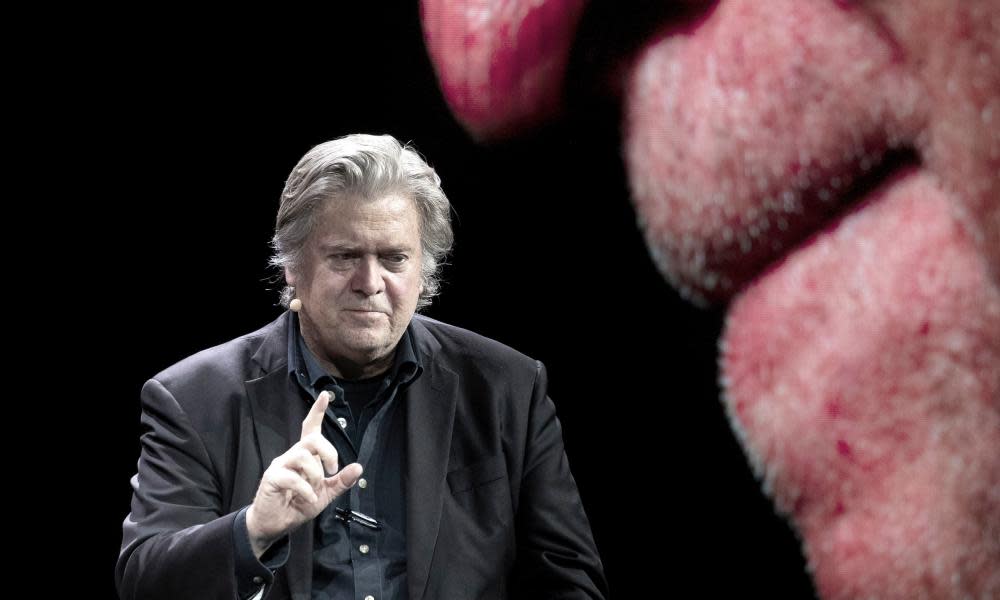Steve Bannon greeted by protesters and scepticism in Edinburgh

Steve Bannon, the former Donald Trump strategist, was greeted with protests, scepticism and occasional derisive laughter when he spoke at a European media conference in Edinburgh on Wednesday, where he assured his audience that the populist nationalism he espoused was “the exact opposite of racism”.
Scotland’s first minister, Nicola Sturgeon, pulled out of the News Xchange conference, co-hosted by the BBC, last month when she discovered that Bannon was attending, stating that while she believed passionately in free speech she would “not be part of any process that risks legitimising or normalising far-right, racist views.”
Protesters who gathered outside the conference venue on Wednesday criticised the BBC for its involvement in the event, describing its decision to invite Bannon as “shocking”. Police Scotland said one demonstrator was arrested and charged with threatening and abusive behaviour. The demonstrator was reportedly carrying a sign that read “Nae Nazis”.
Penny Glover, of Stand Up to Racism Scotland, said: “Invitations like this make people credible. This was the man who dreamt up Trump’s Muslim ban; now he’s going round Europe talking to fascist thugs. These are dangerous times and I’m really pleased that people have come out to protest because we need unity.”
In early September, Bannon’s planned appearance at the New Yorker festival was cancelled after a backlash that involved Hollywood figures including Jim Carrey, John Mulaney, Patton Oswalt and Judd Apatow warning they would withdraw from the event if he appeared.
Later in September there were protests in New York as Bannon was interviewed in front of a live London audience via video link at the Open Future festival organised by the Economist, during which he defended far-right political figures in Italy and Hungary.
The last-minute announcement by the University of Oxford’s union earlier on Wednesday that Bannon would be appearing there on Friday has reportedly caused a row among the society’s governing body, and several other student groups have called for the invite to be withdrawn.
Bannon, during a combative interview with the BBC’s Scotland editor, Sarah Smith, dismissed Sturgeon’s concerns as “a smear”, claiming “these are not racist views”.
He said: “This is a working-class movement. That smear to say it’s racism is too simple. That’s one of the reasons populism is catching fire throughout the world.”
Since leaving the White House, Bannon has drawn heavy criticism for his association with rightwing populist and far-right nationalist parties across Europe, after establishing a foundation called the Movement, which he says will offer polling, data targeting and support for populist nationalists in the European parliament elections next May.
Bannon, who has consistently refused to distance himself from blatantly racist or repressive statements made by the likes of Hungary’s Viktor Orbán and Italy’s Matteo Salvini, said he was “100% comfortable working with them”, describing the politicians as “heroes”.
In an hour-long Q&A characterised by constant deflection, Bannon accused “media elites” of distorting global politics. Smith asked him: “Does Donald Trump tell lies?” Bannon responded: “Would you ever ask that question of Barack Obama? This is why the media is so disliked by middle- and working-class Americans.”
In reference to Jim Acosta, CNN’s chief White House correspondent, who had his press pass revoked last week hours after a testy exchange with the president, Bannon said: “In this situation you need a time out. It’s not about asking tough questions, but I don’t think you can get into a debate with the president in a press conference. I think you have to have a way you comport yourself.”
He added: “What Jim [Acosta] has done is get too argumentative. That’s not the role of the press.”
Predicting that migration would be a big issue in next year’s EU elections, he said: “I think it’s going to have the intensity of a US presidential election and finally issues are going to get out there and they’re going to be hotly debated and I think the turnout is going to be huge.”
The BBC director-general, Tony Hall, speaking at the same event, said the corporation would strongly oppose calls to “no-platform” political voices, because its job was to be impartial and seek facts “no matter how inconvenient they may be for others”.
He said: “On Twitter there are constant anonymous threats to journalists simply reporting on opinions that some people might not want to hear. Some of the material that journalists have had to face is quite frankly disgraceful. It is an attempt to intimidate people and stop them doing their jobs.”
The BBC’s editorial decisions have come under increased scrutiny in the aftermath of the EU referendum, and it has faced calls to restrict appearances by certain individuals and stop giving a platform to politicians such as Nigel Farage or the political donor Arron Banks.
Lord Hall used his speech to say the BBC would not give in to these calls. “For the sake of all journalists we need to defend our role, seeking out the facts no matter how inconvenient they may be for others. Because journalism matters, whether you’re in broadcasting, in the press or working online.”
He called for other news outlets to join him in defending this principle. “If there are ways we can work together to defend journalism, the BBC stands ready to work with others across the industry to do just that.
“But I believe public service journalism has a unique role in the mix. We’re not in the business of one-sided arguments. Our core value is impartiality – a fair reflection of the world as we understand it. In an era of dispute it is one of our most precious assets.”

 Yahoo News
Yahoo News 
